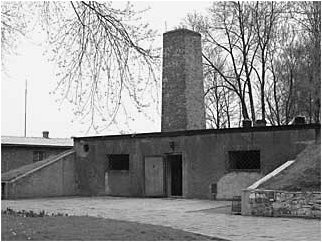Visiting the Nakba and the Holocaust on the other
Inside Crematory 1, Auschwitz, still standing for visitors. This photo taken in 1946 by Zbigniew Klawender and now in the Auschwitz-Birkenau State Museum Archives which preserves detailed records of the Holocaust.
Palestinian students visit Auschwitz in first organized visit
Visit is part of program that aims to teach Israeli and Palestinian students about the other side’s suffering in effort to study how empathy could facilitate reconciliation.
By Matthew Kalman, Haaretz
March 28, 2014
A group of 30 Palestinian students arrived at Auschwitz-Birkenau on Thursday, in what is believed to be the first organized visit by Palestinian students to a Nazi death camp.
The students are spending several days in Kraków and Oświęcim guided by two Jewish Holocaust survivors.
A news blackout on the trip was requested by the organizers. The presence of the Palestinian group at Auschwitz-Birkenau is being reported here for the first time.
The students from Al-Quds University and Birzeit University, near Ramallah, are participating in a joint program on Reconciliation and Conflict Resolution with the Friedrich Schiller University in Jena, Germany, and Ben-Gurion University of the Negev.
The program’s aim is for Israeli and Palestinian students to learn about the suffering that has helped shape the historical consciousness of the other side.

Last week, a group of Israeli students visited the Dheisheh refugee camp [above], located south of Bethlehem, to learn about the Palestinian experience of suffering during the founding of Israel in 1948 – known to Palestinians as the Nakba (“the catastrophe”).
The reactions of each group will be studied by a group of PhD psychology students to see whether exposure to the conflicting historical narrative helps the students to understand their enemy, and facilitates efforts toward reconciliation and coexistence.
The Palestinian side of the program is directed by Mohammed S. Dajani, professor of American Studies at Al-Quds. Because of the Palestinian freeze on joint projects with Israeli universities, the Palestinian students are participating under the banner of Prof. Dajani’s Wasatia movement of moderate Islam.
Israeli groups regularly visit refugee camps in the West Bank searching for cross-border understanding, but the Palestinian visit to Auschwitz is unprecedented. It grew out of a visit by Prof. Dajani as part of a large Jewish-Muslim-Christian delegation in 2011, after which he coauthored a New York Times op-ed entitled “Why Palestinians Should Learn About the Holocaust.”

Since then, Prof. Dajani [above] has written what he believes to be the first objective introduction to the Holocaust for Palestinian students in Arabic, which he hopes will become a textbook used in Palestinian schools and universities.
“Basically, we want to study how empathy with the Other could help in the process of reconciliation,” Prof. Dajani says. “I feel I would like Palestinians to explore the unexplored, and to meet these challenges where you might find that within their community there will be a lot of pressure on them not to do it or questioning why they are doing it, or that this is propaganda. I feel that’s nonsense.”
Prof. Dajani says more than 70 students applied for the 30 places on the Poland trip, but five later dropped out because of peer pressure. He says the choice of Dheisheh for the Israeli students was not meant to suggest there was an equivalence or even a direct link between the Holocaust and the Nakba. They were chosen as the symbolic events that have deeply affected the psyche on both sides of the conflict.
“We are seeking knowledge,” he says. “We are seeking to know what has happened; why did it happen; how can it be prevented from happening again? I believe it is very important to break this wall of bigotry, ignorance and racism that has separated us from crossing over to this new realm.”

The site of the most notorious massacre and expulsion of Palestinians in 1948, Deir Yassin, has not been preserved as a memorial of ‘the inhumanity of man to man’. It has been built over by the Kfar Shaul Mental Health Center, an Israeli psychiatric hospital.
“One of my students asked me why we should learn about the Holocaust when the Israelis want to ban even the use of the word ‘Nakba,’” he adds. “My response was: ‘Because in doing so, you will be doing the right thing. If they are not doing the right thing, that’s their problem.’”
Prof. Dajani, who was banned from Israel for 25 years for his activities for Fatah in Lebanon in the 1970s and ’80s, says the student program is a practical expression of his belief that Israelis and Palestinians can settle their differences through compromise, moderation and human contact. He says his own visit to the Nazi death camp had a profound effect that he wishes to share with his students.

Outside Crematory 1, Auschwitz
“I was also raised in the culture of denial, so for me, to go and see and look and be on the ground – it was a very sad experience for me. It had a lot of impact,” he admits. “I was shocked about the inhumanity of man to man. How can this happen? Why did it happen? Why would man be this cruel?
“It was shocking for me, because it showed me the deep, deep, dark side of human evil,” he adds.
Prof. Dajani has a track record of espousing views that are unpopular with the Palestinian academic mainstream. He is one of the few Palestinian professors to openly oppose the call for Palestinians and others to boycott Israeli universities.
Hanna Siniora, a veteran campaigner for Israeli-Palestinian reconciliation, says Prof. Dajani’s initiative should be welcomed.
“It’s very important for people to see the viciousness of such acts,” he says. “It should touch them in their humanity, in their sense of understanding that human beings don’t do evil things like that. This has caused a major problem in the Israeli-Palestinian conflict, because the psyche of the Israelis is so tormented by what happened to the Jewish people that they cannot trust anybody.
“This is an educational trip. It opens the eyes and minds,” he adds. “If there is an empty place, I’d like to come along,” he says.




